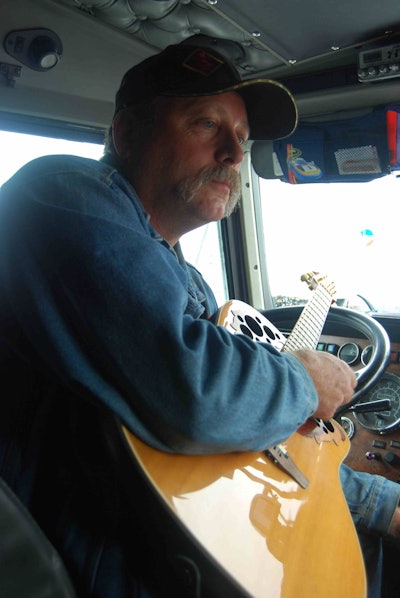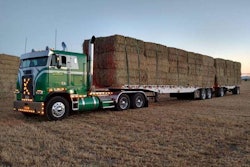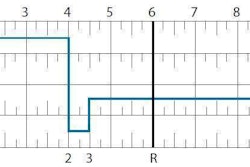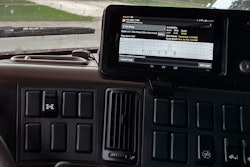

“I love it!” he exclaimed, then offering a bit of a war whoop — “Whoo-hoo!”
If you haven’t read Overdrive news editor James Jaillet’s initial round-up of the rule’s details, know that the ELD mandate final rule includes a significant exception for operators of pre-2000 model year trucks, in part a result of the agency’s recognition that not all such trucks, even those with electronically controlled engines, have standardized in-cab ports to the electronic control module or even an ECM to begin with, of course. Requiring retrofits of such trucks to enable the ability to automatically record drive time, it’s my guess, may have put the rule above the cost-benefit threshold FMCSA needed to get it approved for publication.

In the rule’s full text, FMCSA suggests as much, rounding up a series of comments that showed ranges of estimated retrofit expenses for trucks with mechanically-controlled engines from a couple hundred up to $1,000 or more. Add that to the cost of devices on the market today that FMCSA averaged to around $160 annually for one type to just more than $400 for a second type, with in the real world a lot of variance around that, and costs mount up when considering the large number of units operating with e-logs.
“After reviewing the comments,” FMCSA says in the rule’s justification’s text, “the Agency believes that imposing a requirement for ELDs on pre-model year 2000 vehicles is not feasible in all cases and that trying to distinguish when it is a viable option is too difficult in this rulemaking and next to impossible at the roadside.”
I do see a potential problem, however, in how the rule might apply to the relatively rare case of a 2000 or later model year truck that’s been outfit with an older, mechanically-controlled engine. FMCSA emphasizes its pre-2000 exemption in various places throughout the rule’s justification as an attempt to not introduce compliance confusion and undue financial burden (on the around 220,000 such trucks it estimates will be on the road when the rule goes effect in 2017) through the rule, but the rule itself doesn’t seem address an explicit concern of the Truck and Engine Manufacturers Association, also included in the rule’s justification text:
The Truck and Engine Manufacturers Association … noted the additional requirement that the engine actually have an ECM is crucial in the event that a mechanically controlled engine was installed in a vehicle with a model year 2000 or later.
I will try to get some clarity on this in the coming days from FMCSA (I’ve already put a question to them to this point), but my thinking goes like this: by not addressing any retrofit requirements of devices that will be mandated, the agency is by default excluding any model-year truck with an engine not built to be electronically controlled.
The rule dropped with 516 pages of text you can peruse in full at this link.
Uptick in mechanical gliders on the way, perhaps? …. (To say nothing of the market for pre-2000 trucks, eh? — see reader Cliff Downing‘s comment below.)
Whatever the case, owner-operator Salmon says it all just gives him another reason to rebuild, again. He’s about 800,000 miles into the first rebuild, conducted about six years ago at 1.3 million miles. “When I go down, I’ll rebuild again. It’s cheaper anyway than truck payments,” he says.
Next year, a fresh coat of paint he’s planning will spruce up the Caterpillar 3406E-powered W900, too, and three years from now, he says, “I’ll be doing what I’m doing today.”
For those out there facing the mandate, which if this rule stands would go into effect December of 2017, Salmon nonetheless stands with those who object to the rule. “If I have to be monitored,” he says, “in other words, the government doesn’t believe I’m telling the truth with my log book.” In effect, he says, trust but verify is a preferable hours enforcement protocol than the fundamental distrust he believes the mandate reflects.
“That would be the better way of doing it,” he says.
The Owner-Operator Independent Drivers Association issued the following statement, pushing back against the mandate and allowing for potential formal challenge down the road:
We are reviewing the rule’s details and will be interested to learn the specifics on how the agency intends to deal with the issue of harassment. We know of no technology that automatically tracks a driver’s record of duty status, and so ELDs will not be able to verify compliance with hours of service regulations. ELDs can only track movement of a truck and approximate location, not the work status of a driver, which requires input from the driver. The government’s own data shows that carriers with ELDs crash more, not less, based on miles traveled. Also, note that ELDs can be revised remotely by a carrier.
Alaska-based Kevin Kennedy reflected Salmon’s point of view, among others, noting in a lengthy comment under Jaillet’s story that “perhaps the biggest insult I always hear from the e-log advocates really has to do with the premise of ‘not cheating’ or ‘level playing field.’ Both of those pretexts make the assumption that the vast majority of us are somehow cheaters, or we somehow aren’t to be trusted.” Read more of his thoughts below or follow this link for his full commentary.
Where do you stand? Drop a comment below, and if you’re reading on your phone, tap the button below to weigh in with a voice message (desktop/laptop readers can dial 530-408-6423).
Some early reactions follow.
 Be sure to state your name and base location with any message.
Be sure to state your name and base location with any message.Via OverdriveOnline.com
This is really going to drive up the market for pre-2000 trucks. I can see the restoration parts suppliers dancing in the street. Those folks who do not have to deal with California and that emissions game are in the winning seat if they have a pre-2000 truck.
I have a love-hate relationship with ELDs. I liked the fact that logging was easier; it knew where I was and added it to the log, and it calculated how much time that I had left. What I hated about it was that the 15-minute window goes away, and I always felt rushed from having to watch the clock too closely.
Kevin Kennedy: I became a trucker for the freedom, self-reliance, and common sense the career both required and provided. I’ve been a trucker for over 22 years. The [largest fleets] and their ATA association have driven the narrative on this topic. Whenever I hear someone saying how much they like and prefer the ELD, I always ask if they have ever run under paper logs. The answer 99 percentof the time is no. How can they make an honest comparison if they don’t realize just what they are giving up? The sad and simple truth is the hours of service rules do not fit the economic reality of the very diverse trucking industry. I ran three months under e-logs and hated it. They remove basic human dignity by allowing us to be tracked every second of every minute, but they are reinforcing the continued dumbing down of the industry. I’ve seen a lot of change in this industry (and nation), and it is not good. Most new drivers cannot trip plan to save their butts. They don’t have a basic grasp of math, which is required to not only fill out paper logs but to legally master them and “get the job done” safely. E-logs push people to drive very differently than they do on paper logs, and unfortunately not for the better. Perhaps the biggest insult I always hear from the e-log advocates really has to do with the premise of “not cheating” or “level playing field.” Both of those pretexts make the assumption that the vast majority of us are somehow cheaters, or we somehow aren’t to be trusted. Frankly, both the ATA backers and FMCSA cheerleaders have no idea just what they have done. There will be a massive departure of skilled veteran truckers, who make up over 90 percent of this industry.
Join the conversation in the comments section under this post.
Via Facebook:
Kevin Mossman: I have my own business and truck. I do not support e-logs at all, and will never support it. I have written the President, Vice President, Governor of Georgia, and FMCSA about this matter. I will stand and fight for what I believe in. …
Jeff Williams: Another reason why I don’t drive truck full-time anymore — and really thinking of quitting altogether. The hassle to just drive part-time isn’t worth it, between a physical every year just because I had high blood pressure one time seven years ago, and now this …
Chris Godbey: Well, I’m either done or I’m in the market for a pre-2000 truck. Not sure which yet….
More via this link to Overdrive’s Facebook page.










